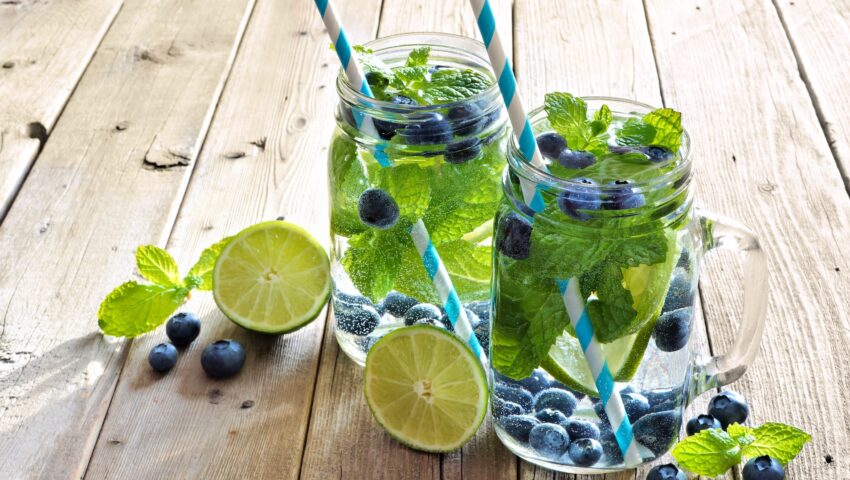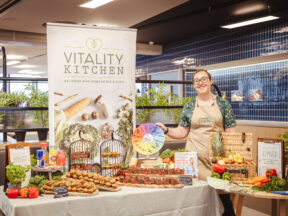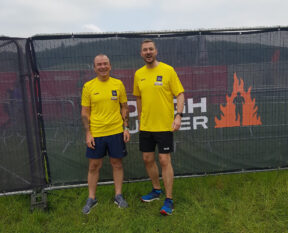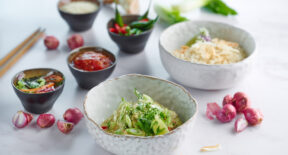Blogs
Six tips to stay hydrated

Staying hydrated is important for our overall health. Water is essential and plays a crucial role in keeping us healthy by regulating body temperature, transporting nutrients and oxygen to cells to removing waste products from the body. Without enough water, the body can become dehydrated, leading to a range of negative health effects, including headaches, fatigue, dizziness as well as loss of concentration!
In the UK, the recommendation is to drink 1.5 to 2 litres daily, this is about 6-8 glasses.
However, this recommendation can vary and depends on a person’s age, weight, activity level, and climate. For example, when it’s warmer in the summer months or if you’re an active person, it’s more so important to stay hydrated. We tend to sweat more causing our bodies to lose more water and electrolytes resulting in us being tired and sluggish. Therefore, it’s key to ensure we drink plenty of water throughout the day as well as before, during, and after exercise to keep our body hydrated and energized.
It is also important to note that water is not the only source of hydration – of course, water is the best option but other drinks like tea, coffee (just skip the sugar, full-fat milk, or cream), and fruit juice can also contribute to overall water intake. However, just be mindful of the additional calories and sugar in drinks other than water- if you love fruit juice try to limit this to 150ml per day, to help reduce your intake of added sugars and calories.
Tips on how to stay hydrated!
- Always keep a water bottle with you– This makes it so much easier to ensure you are drinking enough water throughout the day, especially if you’re on the go. Plus, you can keep track of how much water you’re drinking and set goals for yourself- I have a water bottle with the times marked on it, I find this super handy to have as if I haven’t drunk enough by a certain time it gives me that gentle nudge to catch up!
- Another great way is to set reminders– this can be done on your phone or computer! This is ideal if you are having a super busy time just runs away with you and before you know it you haven’t drunk a drop!
- Drinking water doesn’t have to be boring… I’m personally not a massive fan of water, therefore I try and add additional flavour to my water such as fresh fruit, herbs, or vegetables. My firm favourite must be watermelon and mint. This can make your water taste more refreshing and encourage you to drink more. Get creative and try your own concoctions!
- Try to drink before you’re thirsty. By the time you feel thirsty, you’re already dehydrated. So, make it a habit to drink water before you feel thirsty. This can help you stay hydrated throughout the day.
- Eat hydrating foods. In addition to drinking water, you can also eat foods that are high in water content, such as watermelon, cucumber, strawberries, and tomatoes. These foods can help keep you hydrated and provide additional nutrients.
- Try to drink water with meals. Drinking water with meals can help you stay hydrated and aid digestion- try to make a habit of drinking a glass of water before, during, or after your meals.
Staying hydrated is key to maintaining optimal health and well-being. By recognizing the importance of hydration and adopting simple approaches like carrying a water bottle, setting reminders, adding flavour via delicious fruits, herbs, or vegetables to your water, and incorporating hydrating foods you can easily make hydration a priority daily. Remember, staying hydrated can be a fun and rewarding journey, and it will lead to improved overall health.
Listen to Charlottes’ podcast on Hydration
Tasty recipes to increase Hydration
Further reading recommendations:
https://www.nhs.uk/live-well/eat-well/food-guidelines-and-food-labels/water-drinks-nutrition/
https://www.bda.uk.com/resource/the-importance-of-hydration.html
https://www.sath.nhs.uk/wp-content/uploads/2020/12/The-Importance-of-Hydration-Article.pdf





